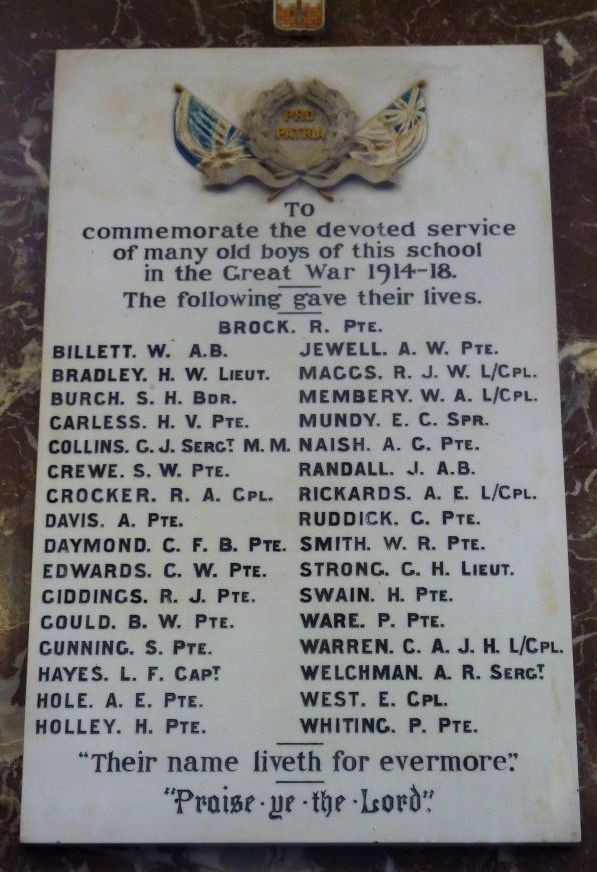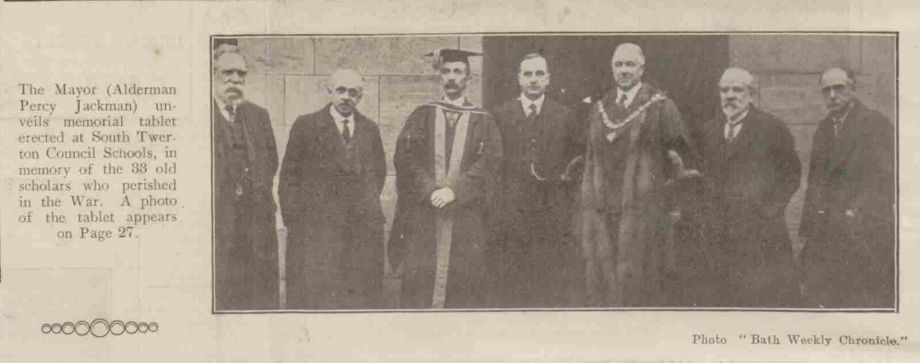Oldfield Park Junior School (Bath) WW1 Memorial Project
South Twerton School (Bath)
(now Oldfield Park Junior School)
WW1 Memorial

This tablet is still on display in its original position at Oldfield Park Junior School (formerly South Twerton School). It is the starting point of this entire research project, which has led to numerous fascinating discoveries about the named servicemen who went from our small corner of the world and died in the battlefields of the First World War. In recognition of the school-wide engagement with the teaching themes around WW1 and the dedicated work of the pupils in researching the servicemen, the hall in which the memorial is displayed was renamed The Memorial Hall (formerly The Blue Hall) in 2014.
From Bath Chronicle & Weekly Gazette, 27th July 1918
SOUTH TWERTON SCHOOL WAR MEMORIAL.
Mr G. E. A. Skinner, Headmaster of the South Twerton Boys' is anxious that the names of the Old Boys of his department, who have perished in the war, should be commemorated by a suitable memorial tablet in the building. So far, 25 former scholars have given their lives. The erection of the memorial will not be proceeded with till the conclusion of hostilities.
From Bath Chronicle & Weekly Gazette, 17th January 1920

SOUTH TWERTON COUNCIL SCHOOLS
MAYOR UNVEILS WAR MEMORIAL
COMMEMORATION OF THE GALLANT DEAD
THE MAYOR'S TRIBUTE.
AN HONOURED RECORD.
THE MEMORIAL UNVEILED.
THE MEMORIAL DESCRIBED.
MAYOR UNVEILS WAR MEMORIAL
COMMEMORATION OF THE GALLANT DEAD
The
memorial tablet erected at the South Twerton Council Schools in memory
of the 33 old scholars who perished in the war was unveiled on Thursday
afternoon by the Mayor (Alderman Percy Jackman) in the presence of a
large company of parents and scholars. Alderman C. H. Long presided,
and others present were Alderman S. W. Bush (Chairman of the Bath
Education Committee), Councillor F .G. Hearse, Mr. G. Orchard, Mr. R.
H. Hope, Mrs. McCullock and Miss Jackman (daughters of the Mayor), Mrs.
C. H. Long and Mrs. G. E. A. Skinner. Members of the school staff
present included the heads the Boys', Girls', and Infants' Departments
— Mr. G. E. A. Skinner, Miss J. Phillips, and Miss Millie Ryall.
The school choir (trained by Miss Phillips) commenced the proceeding by singing 'England' — the words adapted from John of Gaunt's speech in 'King Richard II'.
Alderman Long then welcomed the Mayor, remarking that was the first occasion that his Worship had visited that school. The managers were very proud of that school, and appealed to the present scholars to be very jealous of its reputation.
The school choir (trained by Miss Phillips) commenced the proceeding by singing 'England' — the words adapted from John of Gaunt's speech in 'King Richard II'.
Alderman Long then welcomed the Mayor, remarking that was the first occasion that his Worship had visited that school. The managers were very proud of that school, and appealed to the present scholars to be very jealous of its reputation.
THE MAYOR'S TRIBUTE.
The
Mayor said that when Mr. Skinner asked him to perform that ceremony and
thereby to show his official recognition of what the old boys of South
Twerton School had done in the cause the Empire, he felt very proud,
and was glad to give his consent immediately; because felt the citizens
were glad to recognise what the boys of South Twerton and their masters
had done, not only for our city, but for our country. The old boys of
that school made a noble response in the hour of thejr country's need.
No fewer than 170 of their number enlisted in the first year of
the War (hear, hear). That tablet recorded the names of those who had
made the supreme sacrifice. They mourned their loss; but at the same
time they thought with pride of their sacrifice so readily made, which
saved us at home from a fate even worse than slavery.
AN HONOURED RECORD.
His
Lordship then read some particulars of the careers, civil or military,
and the gallant end of many of those whom the tablet commemorated.
Sapper Mundy, of the Wessex R.E, the first old boy to fall*, perished
in August, 1915. He frequently wrote home, and expressed pride, in his
letters, at the response of the South Twerton lads to their country's
call. Capt. Hayes, of the South Staffordshire Regiment, who rose from
the ranks, was killed at the head of his platoon while recapturing a
position which had been lost. Lieut. H. W. Bradley, of the Royal Welsh
Fusiliers, was a cousin of Capt. Hayes, and on leaving Bath obtained a
position in the laboratory at the Swindon Secondary School. He obtained
a high place in a Civil Service Examination, and subsequently held an
important appointment in London. Lieut. Strong, the headmaster of St.
Saviour's Schools, was for ten years associated with South Twerton, as
a pupil and assistant master. Coached by him, the football team twice
won the Association League Cup. Sergt. G. Collins, of the 6th Somerset
L. I. gained the Military Medal. Lance-Corporal W. A. Membery, of the
same regiment, became organist of the Walcot Wesleyan Church. Other
fallen scholars to whom the Mayor made special reference were
Lance-Corporal Claude Warren, of the 5th Dorsets, who was killed at
Cambrai, Rifleman Percy Whiting, of the King's Royal Rifles; Pte.
Crewe. Pte. S. Gunning, Pte. H. Holley, Pte. W. R. Smith, and Pte.
Harold Swain, whose fate was not known with certainty for some two
years. Seamen who perished were A.B.s William Billett** of the
Monmouth, and Joseph Randall, of the Pheasant.
The Mayor remarked that while they honoured the fallen, they did not forget to welcome those who had safely returned. They recognised the high ideals of belief in the supremacy of right over wrong, discipline, and forbearance, which animated those who had fallen. The existence of such high ideals formed an evident tribute to the teaching of the headmaster (applause). The recollection of these sacrifices should inspire and encourage us as we devoted our efforts in these critical days to the work of reconstruction, and endeavoured by God's help to work for the common weal, animated by feelings of good will to all men (applause).
The Mayor remarked that while they honoured the fallen, they did not forget to welcome those who had safely returned. They recognised the high ideals of belief in the supremacy of right over wrong, discipline, and forbearance, which animated those who had fallen. The existence of such high ideals formed an evident tribute to the teaching of the headmaster (applause). The recollection of these sacrifices should inspire and encourage us as we devoted our efforts in these critical days to the work of reconstruction, and endeavoured by God's help to work for the common weal, animated by feelings of good will to all men (applause).
THE MEMORIAL UNVEILED.
The
Mayor then drew aside the Union Jack which veiled the tablet, and after
a few minutes' silence, the school choir led the singing of the hymn,
'How bright those glorious spirits shine.'
Ald. Bush moved a vote thanks to the Mayor for performing that ceremony. He remarked that such an occasion must inevitably have sorrowful associations, and therefore would not ask the boys to give three cheers for his Worship, as he would otherwise have been glad do.
In seconding the vote of thanks, Mr. Orchard remarked that had been for 18 years associated with that school. A better lot of boys than the scholars of South Twerton he had never met. They were met on a unique occasion that afternoon — an occasion which had its element of sadness. Happily both his own sons had returned safely from the war; but he felt able to sympathise with those parents that afternoon who had lost their dear ones. He believed that the parents of South Twerton were proud of the school. he complimented the headmaster on the special features of the school curriculum, particularly the swimming and gardening classes.
In acknowledging the compliment, the Mayor reminded the scholars that their fallen comrades had earned the reputation of good sportsmen. He urged the present scholars to make it their ambition always to play a clean game.
Mr. Skinner thanked Mr. Alderman Long, who is the Chairman of the South Twerton School Managers under the new regime, for presiding at that afternoon's function. The headmaster jnade some further observations on the value of School sports, and remarked that those whom the tablet commemorated had lived lives which left fragrant memories behind them. He acknowledged the general interest which the parents of Scholars took in the school, and enumerated the various war funds and kindred activities which the scholars of the various departments had assisted.
Councillor Hearse seconded the vote of thanks to Mr. Long, and with that gentleman's acknowledgment the proceedings ended. Tea was afterwards provided for the visitors.
Ald. Bush moved a vote thanks to the Mayor for performing that ceremony. He remarked that such an occasion must inevitably have sorrowful associations, and therefore would not ask the boys to give three cheers for his Worship, as he would otherwise have been glad do.
In seconding the vote of thanks, Mr. Orchard remarked that had been for 18 years associated with that school. A better lot of boys than the scholars of South Twerton he had never met. They were met on a unique occasion that afternoon — an occasion which had its element of sadness. Happily both his own sons had returned safely from the war; but he felt able to sympathise with those parents that afternoon who had lost their dear ones. He believed that the parents of South Twerton were proud of the school. he complimented the headmaster on the special features of the school curriculum, particularly the swimming and gardening classes.
In acknowledging the compliment, the Mayor reminded the scholars that their fallen comrades had earned the reputation of good sportsmen. He urged the present scholars to make it their ambition always to play a clean game.
Mr. Skinner thanked Mr. Alderman Long, who is the Chairman of the South Twerton School Managers under the new regime, for presiding at that afternoon's function. The headmaster jnade some further observations on the value of School sports, and remarked that those whom the tablet commemorated had lived lives which left fragrant memories behind them. He acknowledged the general interest which the parents of Scholars took in the school, and enumerated the various war funds and kindred activities which the scholars of the various departments had assisted.
Councillor Hearse seconded the vote of thanks to Mr. Long, and with that gentleman's acknowledgment the proceedings ended. Tea was afterwards provided for the visitors.
THE MEMORIAL DESCRIBED.
The
memorial tablet consists of a fine slab of white marble bearing an
inscription and the names of the 33 lads who have given their lives.
Above the inscription there is carved a wreath in relief, surrounding
the words " Pro Patria." On one side of the wreath appears the Union
Jack, and on the other the Naval ensign. These banners are coloured.
The whole is superimposed upon a large slab of red marble which forms a
border with a moulded edge.
The tablet bears the inscription:
The tablet bears the inscription:
Pro Patria.
To commemorate the devoted service of many old boys of this school
in the Great War, 1914-18. The following gave their lives.
To commemorate the devoted service of many old boys of this school
in the Great War, 1914-18. The following gave their lives.